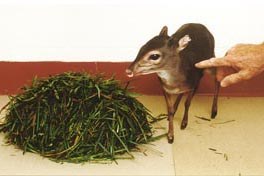
A Blue duiker at home at Penn State.
Blue duikers (Cephalophus monticola) are African antelope and are true ruminants, weighing 4-5 kg. as adults. Twenty-four duikers were captured by Robert L. Cowan (with the help of the National Parks Board rangers and as many as 50 African bushbeaters) per capture effort. Sixteen (six males and ten females) survived the required 60-day quarantine in Naples, Italy, and 30 days in a USDA facility in Clifton, New Jersey, and arrived at the Philadelphia Zoo in April 1977.
Ruminants can be imported from Africa only for exhibition in USDA-approved zoological parks. The zoo agreed to exhibit and breed the duikers, giving the offspring to Penn State University to start their breeding herd for the purpose of developing a miniature laboratory subject for ruminant nutrition research. These animals were docile from the day of capture and adapted well to modified rabbit cages for metabolism and digestion trials. Dissection of available carcasses revealed typical ruminant anatomy with rumen-reticular volume ranging from 500 ml. in pellet-fed zoo duikers to 1 liter in wild specimens. Preliminary trials showed digestion coefficients for alfalfa to be very similar to those for sheep fed comparable forage. In spite of weekly visits by Cowan, trying to correct flaws in zoo management, all but four died by 1980, with no surviving offspring-a total failure.
Establishing the Penn State deer pens as a zoological entity appeared to be the most practical way to bring the duikers into a controlled management program. Negotiations with APHIS (Animal Plant Health Inspection Services) at USDA resulted in approval of the Penn State Zoo Park proposition. Cowan returned to Africa in March 1981 with permits to capture 30 duikers. The first quarantine period was to take place in Italy, but interim changes in Italian regulations effectively forced a change of plans. Negotiations (which continued for nearly six months) finally resulted in moving the 24 surviving duikers to a USDA-approved quarantine station in the Namib desert. This station had no water or electricity. Cowan rented space in an old barn, built cages, and lined the walls with cast-off fish net. He lived in a small camper trailer and made weekly trips to town for groceries and water. The quarantine period was for 60 days, but the first blood test in two duikers was positive for Rinderpest. Removal of the infected animals, cleanup, and further testing to ensure disease-free animals lengthened the quarantine period to four months. Twenty animals completed quarantine; two more died during the final quarantine period in the United States. Thirteen females and five males finally arrived at the Zoological Park (deer pens) at Penn State in April 1982.
The duikers prospered in quarantine, reaching a population of about 140 by 1990 (40 born in 1988; 46 in 1989). During 1990 more than 70 animals died, mostly in an outbreak of Bovine Viral Diarrhea (BVD). Also in 1990, ten males and ten females were euthanized to compare their digestive systems with those of other ruminants. The BVD was brought under control by vaccination and efforts of Dr. Lester Griel, Robert Mothersbaugh, and the resources of the Veterinary Science Department of Penn State. Twenty duikers were donated to Dr. Arian Zarkower for research on Johnes disease. Seven pairs were given to Dr. Kevin Pond at North Carolina State University (NCSU) in 1985 under an agreement stipulating that they be used for breeding only until surplus males were available for research. Eight more males were sent to NCSU in 1989. NCSU donated all of their remaining duikers to various zoos in 1990. The duikers remaining at Penn State were dispersed to zoos in 1991-92, except for six pairs given to Cowan. While studbook numbers grew to over 500 animals, fewer than 50 survive in the year 2002.
Author: Robert L. Cowan, Professor of Animal Nutrition
Department of Animal Science
Address
439 Shortlidge Road, Room 109University Park, PA 16802
- Email AskDAS@psu.edu
- Office 814-865-1362
Department of Animal Science
Address
439 Shortlidge Road, Room 109University Park, PA 16802
- Email AskDAS@psu.edu
- Office 814-865-1362

